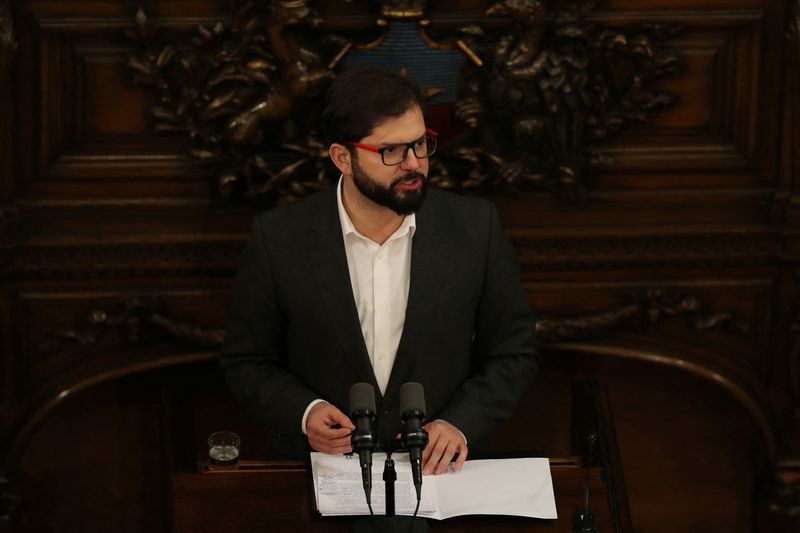3/3

© Reuters. FILE PHOTO: Chile’s President Gabriel Boric delivers a speech during the first session to draft a new constitution, in Santiago, Chile, June 7, 2023. REUTERS/Ivan Alvarado/File Photo
2/3
XP
+4.37%
Add to/Remove from Watchlist
Add to Watchlist
Add Position
Position added successfully to:
Please name your holdings portfolio
Type:
BUY
SELL
Date:
Amount:
Price
Point Value:
Leverage:
1:1
1:10
1:25
1:50
1:100
1:200
1:400
1:500
1:1000
Commission:
Create New Watchlist
Create
Create a new holdings portfolio
Add
Create
+ Add another position
Close
By Natalia A. Ramos Miranda
SANTIAGO (Reuters) – Chilean President Gabriel Boric is struggling to replicate the success of other Latin American leftist leaders in reforming tax codes after vowing as a candidate in 2021 to undertake a restructuring of his country’s free-market system.
Propelled into office by a popular revolt over the shortcomings of Chile’s longtime orthodox economic consensus, Boric was part of a pink tide of South American leaders elected on platforms that promised higher social spending and other policies to reduce inequality.
Colombian President Gustavo Petro was able to pass a tax reform in the first few months of his administration and Brazilian President Luiz Inacio Lula da Silva has seen early success in doing the same.
Boric, however, has faced a tougher climb passing a tax bill that he sees as key to funding investments in healthcare, education, public transportation and other elements of his government’s ambitious economic and social agenda.
An initial legislative proposal, which included hikes on high earners and would have generated revenue equivalent to 2.7% of the country’s GDP, was rejected by lawmakers in March.
Finance Minister Mario Marcel, who helped pass a mining royalty bill despite early opposition from industry and investors, has been meeting with political leaders, business groups and others to build support for a revised tax bill.
That version, which is expected to be scaled down and includes measures to reduce tax evasion and the use of informal labor as well as boost investment incentives, faces an uncertain future.
Unlike the mining royalty bill, the proposed tax reform will require a two-thirds majority in the opposition-controlled Senate before it can be sent to the lower house of Congress. Boric wants the Senate to take up the bill by the end of this month.
“Today, those votes aren’t there,” said Jose Garcia Ruminot, a conservative senator, who added that Boric’s government would have to wait until next year to try to get a tax bill passed.
That task may prove Herculean in light of an economic slowdown and political setbacks that have led to a sharp drop in public support for the government.
A rebound in the fortunes of the political right and a recent scandal that led prosecutors to investigate high-ranking officials in Boric’s administration for possible embezzlement of funds or tax fraud have further clouded the tax reform agenda.
Boric’s government now faces the tall order of convincing the country it won’t misuse public funds on top of getting the opposition on board with tax hikes during an economic downturn, said Nicholas Watson, a managing director at Teneo Consultancy in London.
SLIPPERY PATH
Boric is not the first leftist leader to find the path to tax reform slippery in Chile, a country that has largely attributed its economic success to free-market policies.
Former President Michelle Bachelet faced opposition in her quest to pass a bill through a divided congress in 2014, prompting her government to pull back on many proposed tax hikes and other measures to secure its passage.
Boric’s effort in that regard was dealt a blow last September when voters widely rejected a progressive new constitution that he had backed and which had dominated the early days of his administration.
“Chile’s government was counting on the new constitution being approved,” said Andres Pardo, chief Latin America analyst for XP (NASDAQ:XP) Investments in Bogota. “And if that had happened, the political environment would be different now.”
Senator Ricardo Lagos Weber, a pro-government center-left lawmaker who chairs the Senate Finance Committee, said that while the current situation is difficult, “the government cannot be paralyzed and must go ahead with the votes.”
Many investors and Chilean business leaders opposed to the tax reform warn that passage of even a watered-down bill could dent the economy and point another dagger at its key mining sector. Analysts say there’s been a drop in mining investment and extraction in Colombia since its tax reform was passed.
Opposition to the Lula government’s spending plans also has forced his government to tailor its proposed reform to focus on simplifying the current tax code and merging multiple taxes into a single value-added tax.
“It will be difficult for the (Chilean) government to counter this reasoning given that public opinion has turned against Boric and (his coalition),” Teneo Consultancy’s Watson said.
Source: Investing.com



























